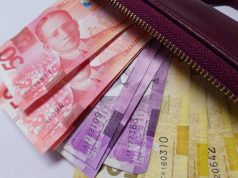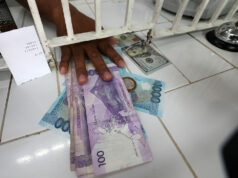Gov’t makes full award of T-bills as strong demand keeps rates low
THE government made a full award of the Treasury bills (T-bills) it offered on Monday even as some tenors fetched higher rates as demand for the short-term securities remained strong.
The Bureau of the Treasury (BTr) on Monday borrowed P20 billion as planned via the T-bills as the offer was almost thrice oversubscribed, with bids reaching P56.687 billion. Yields on the short-term papers ended mixed.
Broken down, the BTr raised P5 billion as planned via the 91-day debt papers out of total tenders worth P19.028 billion. The three-month papers fetched an average rate of 1.167%, down by 1.3 basis points (bps) from the 1.18% logged at last week’s auction.
The government also made a full award of the 182-day T-bills, awarding the programmed P5 billion, as the papers fetched bids worth P11.008 billion. This, even as the six-month securities were quoted at an average yield of 1.518%, up 9.7 bps from 1.421% previously.
The Treasury likewise accepted the programmed P10 billion for the 364-day papers as the tenor attracted tenders worth P26.651 billion. The one-year T-bills fetched an average rate of 1.807%, up 1.9 bps from last week’s 1.788%.
The Treasury made a full award of its T-bill offering as rates were still low despite higher yields on the longer tenors, National Treasurer Rosalia V. de Leon said on Monday.
“Rates remain low, even with adjustment on 182-day [T-bills]. Good demand remains with volume received in the auction,” Ms. De Leon told reporters via Viber after the auction.
Sought for comment, a trader said the 91-day T-bills were quoted at a lower rate as investors prefer the shorter tenor over longer ones amid an uncertain environment.
“The 91-day securities had a lower yield mostly because of the lower inflation rate in August. It will also mature before yearend, giving investors [time] to evaluate [their finance options],” the trader said via Viber.
Inflation eased to a three-month low in August amid improved supply as the economy reopened from another two-week strict lockdown meant to contain a coronavirus pandemic, the Philippine Statistics Authority reported on Friday.
Prices of widely used goods rose by 2.4% last month, bringing the eight-month average to 2.5%. The August print was slower than the 2.7% logged in July but faster than the 1.7% seen in August 2019.
A second trader said investors want to maximize gains from the 91-day papers as they expect the Treasury to accept slightly higher rates, with the central bank signaling steady borrowing costs in the meantime.
“Most players opted to park their excess liquidity at the shortest available tenor in 91-day bills mainly due to expectations of relatively higher interest rates in the coming months as the Bangko Sentral ng Pilipinas (BSP) is expected to pause on its easing ways,” the second trader said via Viber.
“For the longer ones, maybe because of the difference against BSP’s online rate (1.75%), at least for those who have access to it. So the six-month to one-year bills are adjusting higher at the moment,” the trader added.
The BSP’s policy-setting Monetary Board held benchmark rates steady at its review last month on benign inflation and signs of economic recovery following the easing of restriction measures meant to curb the spread of the coronavirus.
Rates on the central bank’s overnight reverse repurchase, lending and deposit facilities are at record lows of 2.25%, 2.75% and 1.75%, respectively.
The Treasury is looking to raise P160 billion from the domestic market this month: P100 billion via weekly auctions of T-bills and P60 billion via Treasury bonds to be offered fortnightly.
The government is looking to borrow around P3 trillion this year from local and foreign lenders to help fund its budget deficit expected to hit 9.6% of the country’s gross domestic product. — KKTJ



